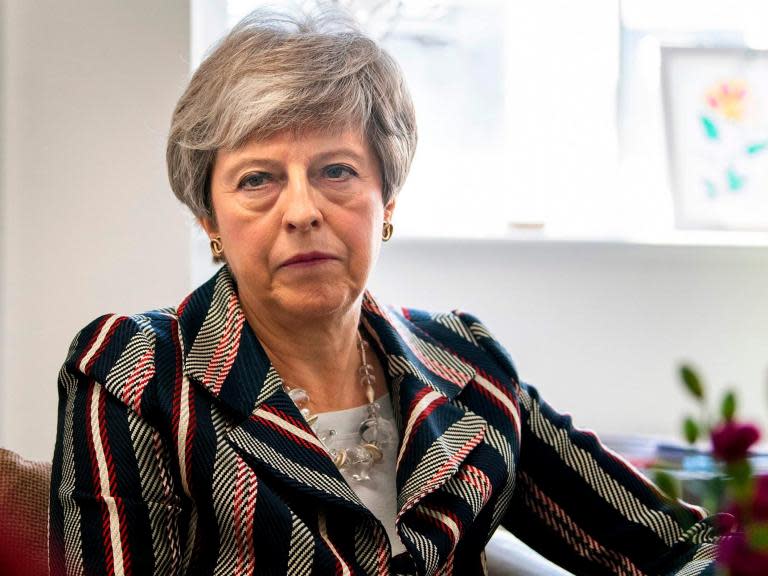Theresa May under pressure to quit amid plunging poll ratings as Brexit negotiations enter seventh week
Cross-party talks on a compromise Brexit deal are hanging in the balance, with Theresa May expected to come under pressure at Tuesday's Cabinet to pull the plug.
No substantive progress is understood to have been made in talks on Monday evening, as Jeremy Corbyn told Labour MPs the Government was not shifting on its red lines.
At a stormy meeting in Westminster, Mr Corbyn came under fire over his ambiguous Brexit stance from a string of Remain-backing MPs, with one warning the party was "haemorrhaging" votes in the upcoming European election to parties - like the Liberal Democrats and Greens - which have given clear backing to a Final Say referendum on any deal.
As Labour's deputy leader Tom Watson and shadow Brexit secretary Sir Keir Starmer both said it looked impossible to get a deal through Parliament without the promise of a "confirmatory" public vote, Mr Corbyn told backbench MPs he understood their frustrations.
Cross-party talks now entering their seventh week broke up without agreement. And notably, there was no immediate announcement from either side of plans for further meetings.
A Labour spokesman said simply that the shadow cabinet and trade unions would be "updated on what has been discussed".
And Downing Street said: “In preparation for an update to Cabinet tomorrow, today’s meeting took stock across the range of issues discussed in talks over the last few weeks. We continue to seek to agree a way forward in order to secure our orderly withdrawal from the EU.”
Tuesday's Cabinet meeting is expected to feature a substantial debate on the state of talks, with some Tories warning that Ms May has no prospect of securing a deal which could win the backing of her own party.
Some urged her to stand down after the May 23 Euro-elections, which polls suggest will deliver a drubbing for her party.
The latest YouGov study for The Times put the Tories on just 10 per cent for the European poll, in an unprecedented fifth place behind Liberal Democrats and Greens. Nigel Farage’s Brexit Party enjoyed a comfortable lead on 34 per cent, ahead of Labour's 16 per cent.
Ms May will be pressed to set out a timetable for her departure when she meets the executive of the backbench 1922 Committee on Thursday, amid speculation that they will clear the way for an early no-confidence vote if she refuses.
One member of the 1922 executive, Nigel Evans, said he hoped Ms May will use Thursday’s meeting to ask chairman Sir Graham Brady to fire the starting pistol in the race to replace her.
Asked whether he expected a Tory humiliation in the May 23 vote, Mr Evans said: "Humiliation? No, it's worse than that.”
Leading Brexiter Jacob Rees-Mogg hit out at the "complete vacuum of leadership" at Westminster, and pleaded with Tory voters to stick with the party in order to provide a base for a new leader to rebuild.
And former minister Ed Vaizey said Ms May should go after the Euro-elections, naming Michael Gove as his preferred replacement.
“The only thing I can see that would keep her in office would be if by some miracle she can produce a deal with Labour and argue that she needs time to see if she can get it through Parliament,” he told Channel 4 News.
Jeremy Hunt, the foreign secretary, said it was "crunch week" for the cross-party negotiations, but rejected the possibility of a second referendum as “a betrayal of what people voted for”.
But Sir Keir Starmer, warned it would be “impossible” to get an agreement through Parliament without the promise of a confirmatory ballot, as up to 150 Labour MPs would reject it.
And Mr Watson said it would be “very, very difficult” to construct a deal which could secure Commons approval without a referendum.
In direct contradiction of close Corbyn ally Barry Gardiner’s insistence that Labour was “not a remain party”, Mr Watson said it was “a remain and reform party” in the context of the Euro-elections.
Their stance puts them at odds with Mr Corbyn’s position that a second referendum remains an option only to prevent no-deal or a “damaging Tory Brexit”.
One Labour opponent of a People’s Vote, backbencher Stephen Kinnock, warned that talks risk being “torpedoed” if Labour introduced an “additional red line” of a second referendum.
Campaigning in Labour MP Yvette Cooper’s West Yorkshire constituency, Mr Farage denounced calls for a confirmatory referendum as “the most outrageous proposal I've ever seen”.
He said Labour was “vulnerable in the most extraordinary way” in Leave areas and predicted a second referendum could pave the way for a Brexit Party majority at the next general election.

 Yahoo News
Yahoo News 

